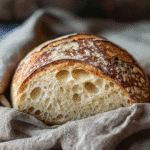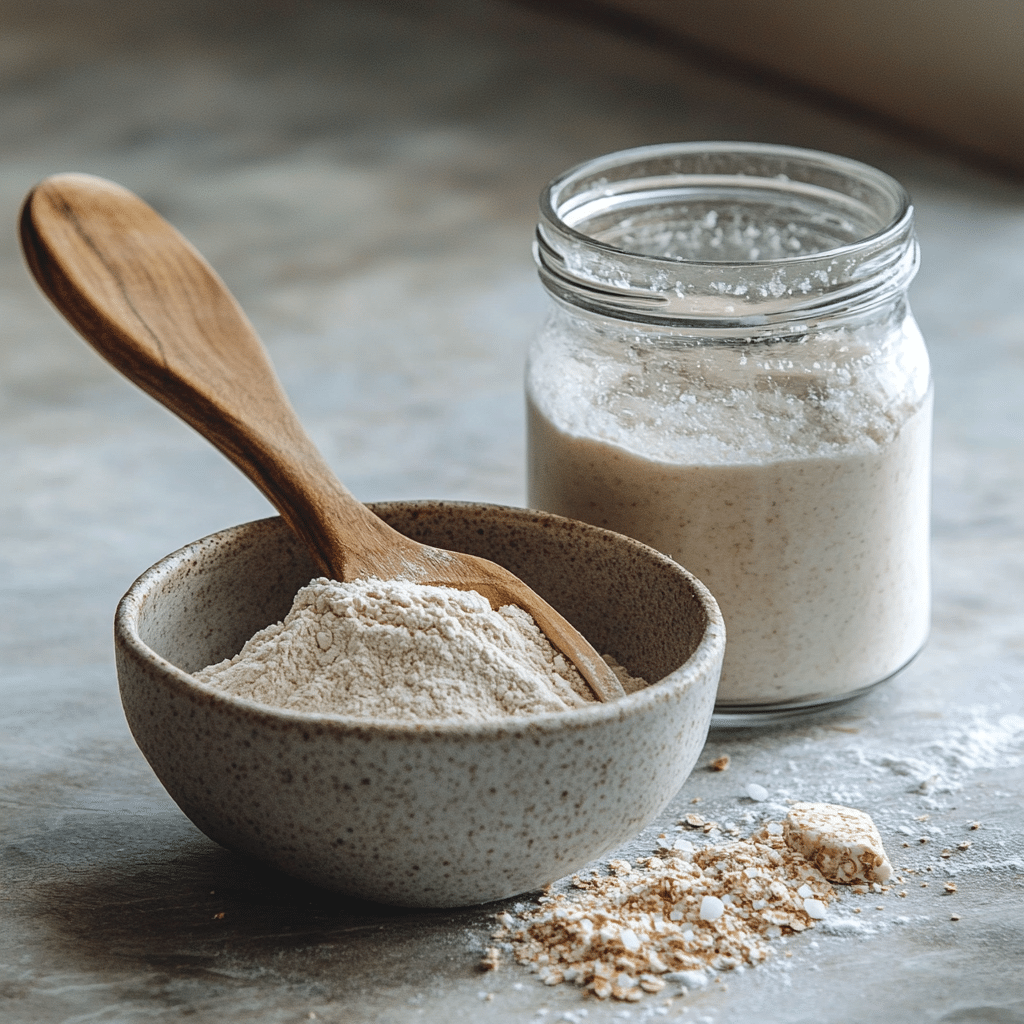Sourdough Low FODMAP: A Gut-Friendly Guide to Enjoying Bread Again
If you’ve ever felt forced to give up bread because of digestive issues, especially while navigating IBS or FODMAP intolerance, you’re not alone. The good news? Sourdough low FODMAP options do exist—and they can be both gut-friendly and delicious. In this guide, we’ll break down how traditional sourdough fermentation reduces FODMAPs, what flours work best for sensitive guts, and how to spot or bake sourdough that supports digestive health. Whether you’re just starting a low FODMAP diet or searching for bread that won’t trigger symptoms, understanding sourdough low FODMAP principles can be your key to enjoying bread again without regret.
My Personal Journey into Sourdough & Low FODMAP
How it started: The perfect storm of sourdough and IBS
I first stumbled into sourdough baking in the least glamorous way possible—trying to impress a date with a homemade boule. Spoiler: the date disappeared, but my obsession with sourdough stuck. Fast forward a few years, and I was juggling motherhood, a growing bakery in Mendocino, and frustrating gut symptoms. Enter the sourdough low FODMAP path. Like many, I feared I’d have to give up bread. But instead of saying goodbye to sourdough, I started experimenting—fermentation times, flour types, hydration levels.
It turns out, my starter “Clementine” was doing more than rising dough; she was reducing FODMAP content, especially those pesky fructans found in wheat. The more I learned, the more I realized sourdough low FODMAP baking could be part of a healing journey, not a trigger. Today, I bake sourdoughs specifically designed for low FODMAP needs and teach others to do the same at Marlene & Crumb. That includes spelt-based sourdough low FODMAP loaves that are gentler on your belly and still absolutely delicious.
Why low FODMAP matters in sourdough baking
The FODMAP acronym stands for fermentable oligosaccharides, disaccharides, monosaccharides, and polyols—short-chain carbs that can ferment in the gut and cause IBS symptoms. Sourdough low FODMAP baking is magical because of its long fermentation. Unlike quick-rise breads, sourdough undergoes a slow process that breaks down many of these fermentable sugars. Studies show traditional sourdough methods can reduce up to 90% of FODMAP content in wholegrain breads.
But not all sourdough is created equal. Supermarket loaves often fake it with sour flavoring agents or skip proper fermentation. The result? A rustic-looking bread that can still cause symptoms. That’s why learning true sourdough low FODMAP techniques is crucial if you’re managing IBS.


Sourdough Low FODMAP: 5 Delicious Reasons to Love Gut-Friendly Bread
- Total Time: ~18 hours
- Yield: 1 loaf 1x
Description
This low FODMAP sourdough bread uses long fermentation and spelt flour to create a gut-friendly loaf suitable for IBS sufferers.
Ingredients
500g white spelt flour
100g active sourdough starter (spelt-based)
350ml filtered water
10g fine sea salt
Instructions
Mix flour and water; rest for 1 hour (autolyse).
dd starter and salt, mix until fully incorporated.
Bulk ferment at room temperature for 4–6 hours, performing 3 stretch-and-folds.
Shape into a boule; place in banneton and cold-proof in fridge for 12–18 hours.
Preheat oven to 475°F with Dutch oven inside.
Score dough, place in Dutch oven, bake covered for 20 min, then uncovered for 25 min.
Cool completely on a rack before slicing.
Notes
Use only spelt or certified low FODMAP flours.
Long fermentation enhances digestibility and flavor.
Slice and freeze for quick, gut-friendly snacks.
- Prep Time: 1 hour
- Cook Time: 45 minutes
- Category: Bread
- Method: Baking
- Cuisine: Traditional sourdough
Nutrition
- Calories: 160
- Sugar: 0g
- Sodium: 180mg
- Fat: 1g
- Carbohydrates: 32g
- Fiber: 3g
- Protein: 5g
Keywords: sourdough low FODMAP, IBS bread, spelt sourdough
What Makes Sourdough Low FODMAP?
Sourdough fermentation and FODMAP breakdown
The secret behind sourdough’s compatibility with a low FODMAP diet lies in its fermentation. True sourdough low FODMAP bread is created using wild yeasts and lactic acid bacteria, which slowly ferment the dough over several hours. This extended fermentation doesn’t just add flavor—it actively breaks down FODMAP compounds like fructans, which are common in wheat-based products and problematic for IBS sufferers.
A well-fermented sourdough made with spelt or wheat flour can significantly reduce FODMAP levels. In fact, some studies suggest that up to 90% of fructans can be broken down during fermentation. That’s why traditional methods are essential when aiming for sourdough low FODMAP results. Quick-rise or commercially produced “sourdough” loaves often skip this critical process, leaving the FODMAP content nearly untouched.
So if you’re experiencing bloating, cramping, or IBS-related symptoms, don’t blame the bread—blame how it’s made. Proper fermentation is the difference between a loaf that nourishes and one that disrupts.
Which flours and techniques matter for low FODMAP bread
When making or choosing sourdough low FODMAP bread, flour selection matters just as much as fermentation time. Spelt flour is one of the best options—it contains fewer FODMAPs than modern wheat and becomes even more digestible through fermentation. White wheat flour, when fermented for at least 12 to 24 hours, can also become low FODMAP. Rye, on the other hand, is typically high in FODMAPs, even after fermentation, and is best avoided during the elimination phase.
Always check the label. If it lists yeast instead of starter culture—or includes added sugar and vinegar—that’s a red flag. You’re likely looking at imitation sourdough.
If you bake at home, give your dough at least 18 to 24 hours to ferment at room temperature. For even better results, use whole grain spelt or a blend with white spelt. These are not only easier to digest but also deliciously nutty and chewy when baked correctly.
Sourdough Bread for IBS Sufferers
Is sourdough good for IBS? What science says
For many IBS sufferers, bread feels like the enemy—but it doesn’t have to be. When made properly, sourdough low FODMAP bread can actually be one of the most gut-friendly options available. The science is catching up to what traditional bakers have known for generations: fermentation changes everything.
IBS symptoms are often triggered by high FODMAP foods—especially those rich in fructans, like regular wheat bread. However, with sourdough, wild yeasts and bacteria pre-digest those sugars, dramatically lowering the FODMAP content. Clinical research has shown that people with IBS tolerate traditionally fermented sourdough far better than standard yeasted breads.
I’ve seen this firsthand with my workshop attendees—many of whom thought they’d never eat bread again. Once they tried slow-fermented, spelt-based sourdough low FODMAP loaves, the difference was immediate. No bloating. No cramps. Just that nostalgic comfort of real bread, without the pain.
Real bread or supermarket tricks? How to tell the difference
Here’s the hard truth: most supermarket “sourdough” isn’t real sourdough. If it’s mass-produced, shelf-stable, and made in under two hours, chances are high it hasn’t undergone the kind of fermentation that breaks down FODMAPs. In fact, many loaves labeled “sourdough” include commercial yeast, vinegar, or “sour flavoring” to mimic the taste—without offering the same gut health benefits.
True sourdough low FODMAP bread takes time. Look for ingredients like “starter culture,” “wild yeast,” or simply “flour, water, salt.” Ideally, the label should note fermentation times or be from an artisan bakery. If you’re buying from a grocery store, stick to certified low FODMAP brands or loaves made with fermented spelt or white wheat flour.

Spelt flour, starter, and other gut-friendly ingredients
Is Sourdough Inflammatory or Healing?
Anti-inflammatory or not: the facts behind the claims
Is sourdough bread inflammatory? It’s a question that stirs up a lot of confusion—especially among those navigating food sensitivities. The truth is, when it comes to sourdough low FODMAP, the bread’s impact on inflammation largely depends on how it’s made and what goes into it.
Properly fermented sourdough doesn’t just reduce FODMAPs; it also makes gluten more digestible, increases mineral bioavailability, and lowers phytic acid, which can irritate some sensitive guts. Unlike ultra-processed white breads loaded with additives, real sourdough contains just a few ingredients—usually flour, water, salt, and time. That simplicity is key. When bread is stripped of emulsifiers and gums, the body has fewer irritants to fight.
Moreover, the lactic acid bacteria in sourdough can support gut microbiota balance—potentially lowering systemic inflammation. While sourdough isn’t a cure-all, it’s far from the inflammatory villain some make it out to be, especially when crafted with low FODMAP flours like spelt or white wheat and given 18–24 hours to ferment.
What else makes sourdough a gut-friendly option?
Beyond FODMAP reduction and anti-inflammatory potential, sourdough low FODMAP bread offers unique benefits that can support overall digestive health. For one, it has a lower glycemic index than most commercial loaves, which helps stabilize blood sugar and reduces digestive distress related to glucose spikes.
The acidity from fermentation not only creates that delicious tang—it also slows down starch digestion, reducing bloating and gas. Plus, sourdough often contains prebiotics—non-digestible fibers that feed your good gut bacteria. If you’re following a low FODMAP plan, nurturing your gut microbiome is vital, and sourdough can be part of that healing journey.
Just be sure you’re eating true sourdough low FODMAP bread made with high-quality, properly fermented ingredients. Whether you’re buying or baking, your gut will thank you.

FAQ: Sourdough and the Low FODMAP Diet
Is sourdough bread low FODMAP friendly?
Yes—sourdough low FODMAP bread made with proper fermentation and low FODMAP flours (like spelt or white wheat) can be a safe choice for many. The long fermentation reduces problematic FODMAPs, making it gentler on the digestive system.
Is sourdough bread good for IBS sufferers?
Absolutely. Many IBS sufferers report better tolerance to real sourdough than standard breads. The key is choosing or baking loaves with long fermentation and low FODMAP flours. Proper sourdough low FODMAP bread supports digestion without triggering bloating or cramps.
Is supermarket sourdough low FODMAP?
Often, no. Many store-bought “sourdough” breads are not truly fermented and may include high FODMAP ingredients or additives. Always check labels and look for slow-fermented options or bake your own for guaranteed results.
Is sourdough bread an inflammatory food?
When made traditionally, sourdough is not inflammatory. It’s often easier to digest, contains fewer additives, and supports gut health. In fact, sourdough low FODMAP options can be part of an anti-inflammatory diet if made with the right flours and fermented properly.
Conclusion
Living with IBS or FODMAP intolerance doesn’t mean saying goodbye to good bread. With the right techniques and ingredients, sourdough low FODMAP bread can be nourishing, satisfying, and gut-friendly. Whether you’re baking your own or seeking out artisan options, focus on real fermentation, simple ingredients, and time-tested methods. Your body—and your taste buds—will thank you.
for more recipes followo me in facebook

